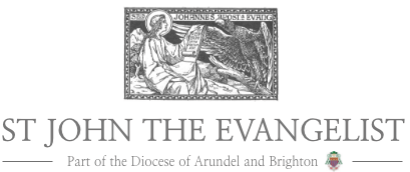St John's News

OPEN DAYS AT ST ROBERT SOUTHWELL CATHOLIC PRIMARY SCHOOL - We are delighted to invite prospective parents and carers to visit our school and see all that St Robert Southwell has to offer. Come and experience our warm, welcoming community, meet our dedicated staff, and see our children’s learning in action. Visit Dates:Thursday 13th November – from 1:30pm–2:30pm and 4:30pm– 6:00pm and Saturday 22nd November – from 10:00am. To book your place, please contact the school office on 01403 252357 or email secretary@strobertsouthwell.co.uk. We look forward to welcoming you to our school!

UPDATED: PARISH VOLUNTEERS’ PARTY, FRIDAY 21ST NOVEMBER – If you volunteer in any capacity here at St John’s – for example, with any element of the Liturgy, with anything to do with our buildings or grounds, in any of our Sacramental or formation programmes, with supporting our housebound parishioners – please join Fr Tristan for a little party on Friday 21st November from 7pm in the Main Hall. If you’re planning to attend, please email the Parish Office at horsham@abdiocese.org.uk, by Friday 31 October, giving your name and the number in your party, split between adults and children.

2026 CONFIRMATION PROGRAMME - the application form for the 2026 Confirmation programme will be available for those in Year 9 and above to collect from Sunday 26th October. They will be available after any Mass from either Fr Tristan or Deacon Tom who will give you a form in person. These will not be available from either the Parish Office or from the website. Please return the completed form with all the relevant documents to the Parish Office by the closing date of Friday 7th December 2025. Late applications will not be accepted.

DIOCESAN VACANCY - Communications Officer, part-time, permanent. Salary: £17,500 for 0.5 FTE (Based on a full-time salary of £35,000). Location: Based in Crawley, with hybrid working & travel across the Diocese required. Application deadline: 16 October Interviews: 22 October in Crawley. The successful applicant will produce and edit accurate, well-written online and offline content across diocesan platforms, telling the Church’s story and its contribution to society. The successful candidate will support the Head of Communications in managing the digital and print presence of the diocese, including content management for our website and social platforms and communications for fundraising campaigns. To find out more and to apply, go to the Diocesan website: abdiocese.org.uk/careers/ptcomms
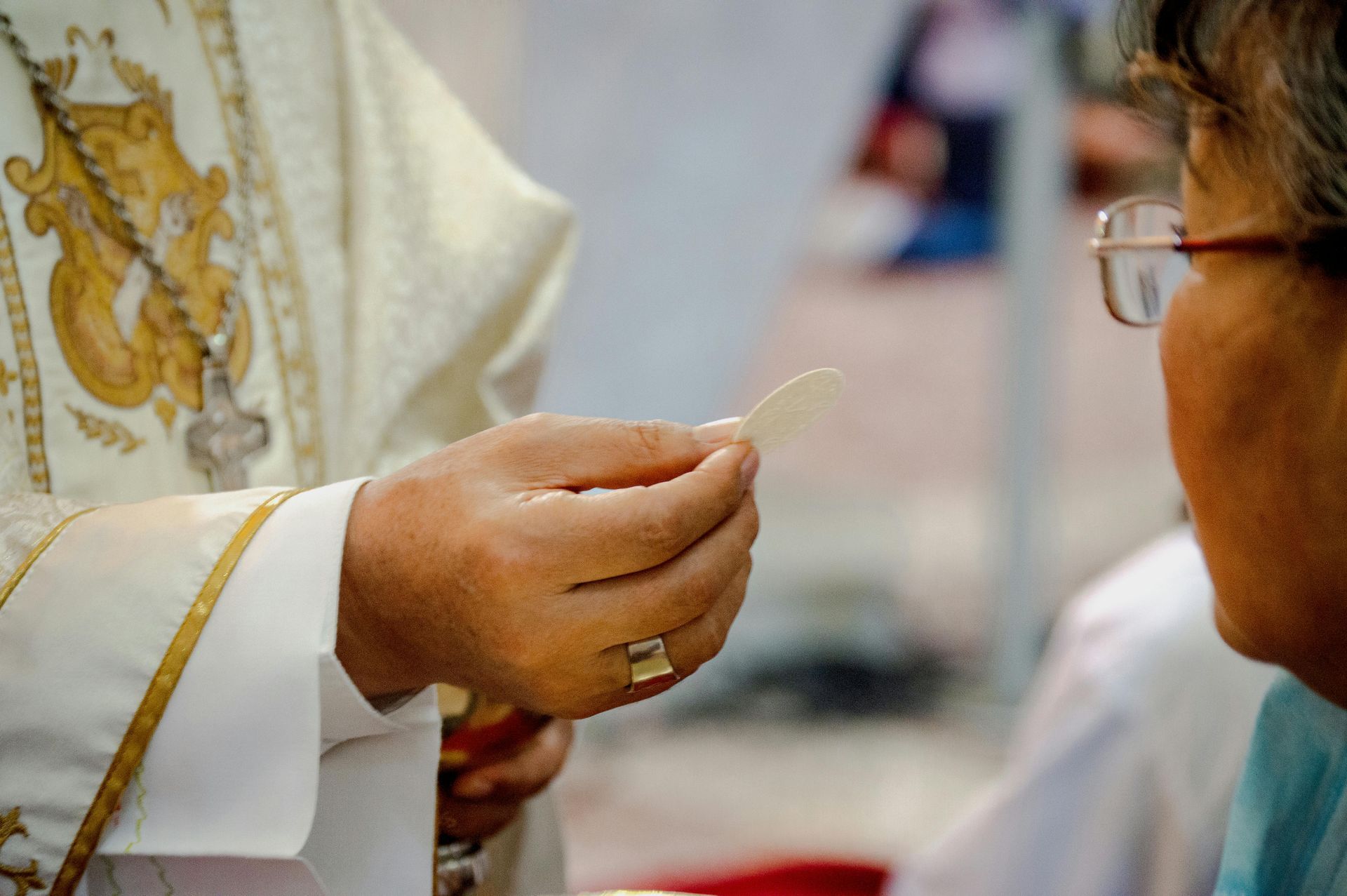
2026 FIRST HOLY COMMUNION PROGRAMME – We are pleased to be able to open applications for next year’s formation for FIRST HOLY COMMUNION (school Year 3 and above). To register your interest, please speak to Fr Tristan or Deacon Tom after any Mass and they will be able to give you an Application Form in person; these will not be available from the Parish Office or from the website. Please return your completed Application Form, together with the necessary supporting documents, by the closing date of Friday 14th November 2025. We are unable to accept late applications, so please get your paperwork into the Parish Office as soon as possible.

Dear brothers and sisters in Christ, Prisoners’ Sunday falls on 12 October, and it takes place, too, in the Jubilee Year that was started by Pope Francis before Christmas last year. The theme of the Jubilee Year is “Pilgrims of Hope”, and so we might reflect this Prisoners’ Sunday, on the need to enable those who are serving sentences, all those affected by crime, and those who work in our prison system, to be able to re-find hope that they have perhaps lost. I ask you on this Prisoners’ Sunday to pray very particularly for victims of crime, for those who work in our prison system and in our justice system, and to remember very specially those who are serving sentences, and those who are the hidden victims of crime, particularly young ones. Keep them in your prayers, reflect on ways in which you might perhaps volunteer for Pact: perhaps become a prison visitor or volunteer with the chaplaincy in your local prison. I encourage everybody to pray on Prisoners’ Sunday, especially during the celebration of Mass, and also for parishes, where they can, please, to hold a Second Collection for the support of Pact, the Prison Advice and Care Trust. Pact has the most wonderful history, and holds a very special place in care for prisoners and their families. With every blessing
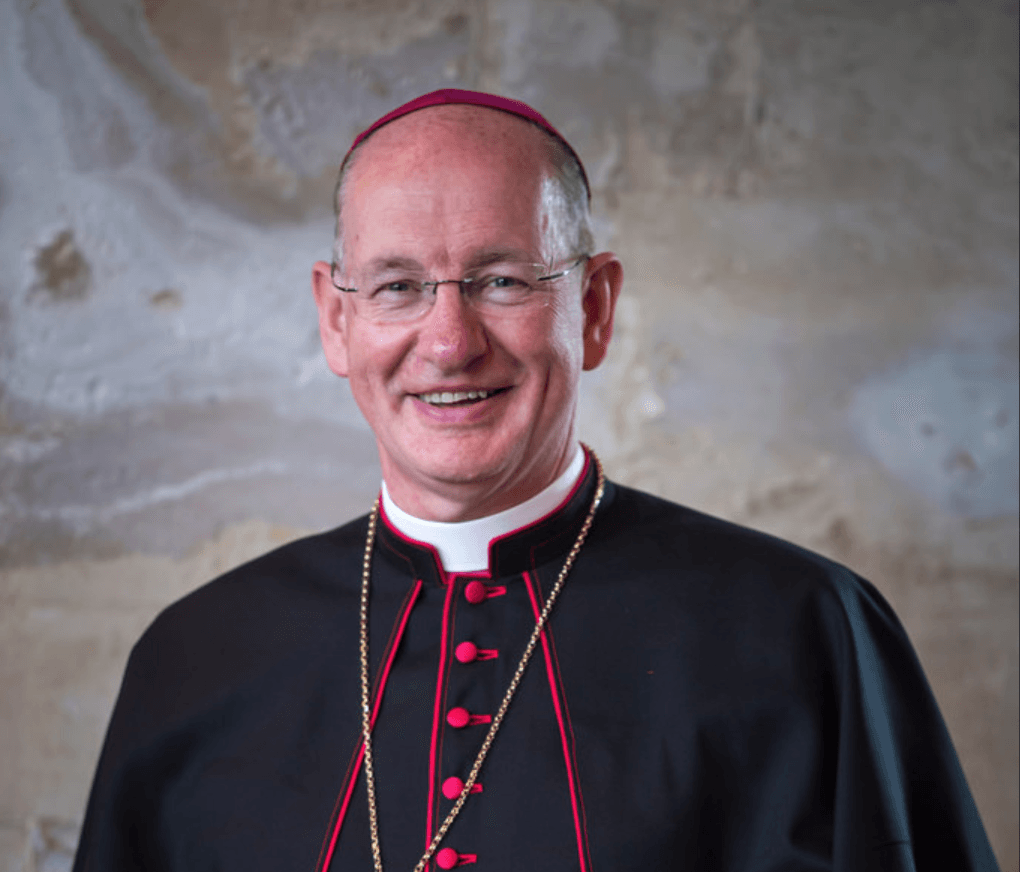
Dear brothers and sisters in Christ, The Parable of the Rich Man and Lazarus is, I always find, especially strong in tone. Jesus gives the rich man no name, yet the poor man has that dignity. At the end of the parable, Jesus points out that "even if someone should rise from the dead" the rich man’s relatives would not be convinced. Jesus, of course, does rise from the dead and His warning is an indication of the all-absorbing lure of riches and power. Like the people against whom Amos speaks in the first reading, the rich man in the parable cares nothing for others. Jesus speaks elsewhere in the Gospel about the lure of riches – in the Parable of the Sower, this is one of the things that chokes the growing shoots, strangling them and preventing the crop. St Paul, writing to Timothy, provides us with the way forward: our lives must be marked by faith, love, patience and gentleness. We are called to be saints. This path is not an easy one – the gospels are filled with the Lord’s warning of the hard road, the narrow gate, the call not to look back, but to keep our gaze on Him, that our steps do not stray. Let us take the warning of the parable to heart, together with the guidance offered us by St Paul, that we do not fall into the traps that lie all around us, but keep mind and heart, every effort, on the building of the Kingdom of God in love and service – for this is true riches. With every blessing,

This weekend, people from all over the Diocese gathered to celebrate 60 years of the formation of the Diocese which took place at Ardingly on Saturday. Reflecting on these 60 years, Bishop Richard, in his pastoral letter this weekend has also been looking ahead to the future. “The journey has seen a good deal of conversation and renewed collaboration taking place across the Diocese, rooted in prayer. These conversations, leading to the development of leadership teams for our new-formed parishes, are bearing fruit. The formation taking place in our communities, together with the increasing working together in our new parishes will pave the way for ever more effective mission across the Diocese. Of course, we have a distance yet to travel; there is much to be done and this will always be so. However, there is no need for us to fear, for all is gift. “Jesus is at your side at every step of the way” Pope Francis reminded us, “He will not cast you into the abyss or leave you to your own devices. He will always be there to encourage and accompany you. He has promised and he will do it: ‘For I am with you always, to the end of the age’.” The full pastoral letter will be read out at this weekend’s masses.
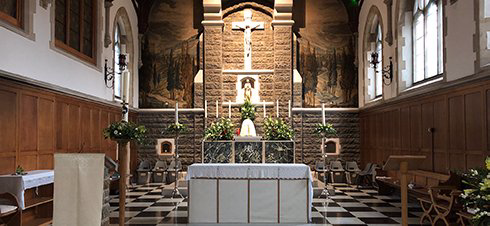
This week we celebrate the feast of the Exultation of the Holy Cross, commemorating the finding of the true cross on which Our Lord Jesus died, discovered by St Helena in the fourth century. Perhaps the name 'exultation' comes from Jesus' famous phrase in today's Gospel: that, like Moses' staff, the Son of Man must be 'lifted up'. Lifting the Cross refers, of course, to the actual raising of Jesus' dying body on Good Friday high above the crowds. However, it also has a deeper meaning: the crucified Jesus is 'lifted' above all the world - lifted by Christians in the manner of their lives imitating His sacrificial charity, lifted by Christians in their hearts which overflow with gratitude and adoration for the gift of salvation from sin and everlasting death. The image of the crucifix is lifted in our churches and homes and schools. It hangs from our necks, or even in our cars. It appears everywhere where Christian’s act in Jesus' name. And yet it is still an object of mockery for many. All the more reason to raise the Cross high in our lives by sharing love, even with those who hate us. A traditional prayer we offer wherever we pass the Cross is theEn Ego, which prays to draw from the Crucified Lord all the grace and all the necessary virtues to live in this way to do just this, and to resolve to follow Him more closely every day. "Behold, O good and most sweet Jesus, I fall upon my knees before Thee, and with most fervent desire beg and beseech Thee that Thou wouldst impress upon my heart a lively sense of faith, hope and charity, true repentance for my sins, and a firm resolve to make amends. And with deep affection and grief, I reflect upon Thy five wounds, having before my eyes that which Thy prophet David spoke about Thee, O good Jesus: "They have pierced my hands and feet, they have counted all my bones" (Psalm 21) Amen."

September arrives, and not only in the blink of an eye does the weather seem to change but people seem to be far busier than they could ever imagine! We can suddenly seem to have so much to think about that we can easily find ourselves wondering whether we have the resources to cope, as schools go back and deadlines loom. In the Gospel today, Jesus warns us about the risk of setting out on the journey to God without having sufficient resources to complete it. Our main resource is surely the Holy Spirit Himself, nourishing us in daily prayer. There's an old adage that says something along the lines of "set a little time to pray every day, except if you are busy, in which case double it!" The other resource we all need to survive the daily challenge of imitating Christ is the support of others. Jesus sent his friends out in pairs, and formed not a society of individuals, but a church. As a priest, I can never forget the fact that the very mission of our parish relies on us all pitching in, helping build each other up, and living our baptismal calling. That is why volunteering in the parish - in the fields of Prayer, Formation and Mission - is so vital, both in our current parish and in the larger parish that we are due to become. I want to express my thanks to all our volunteers by throwing a little party for you all on the evening of Friday 21st November - please save the date! And if you are not already "involved", do have a think about how you might give of your time and talents here at St John's - even in a very small way - to help others along on our journey - and get in touch.
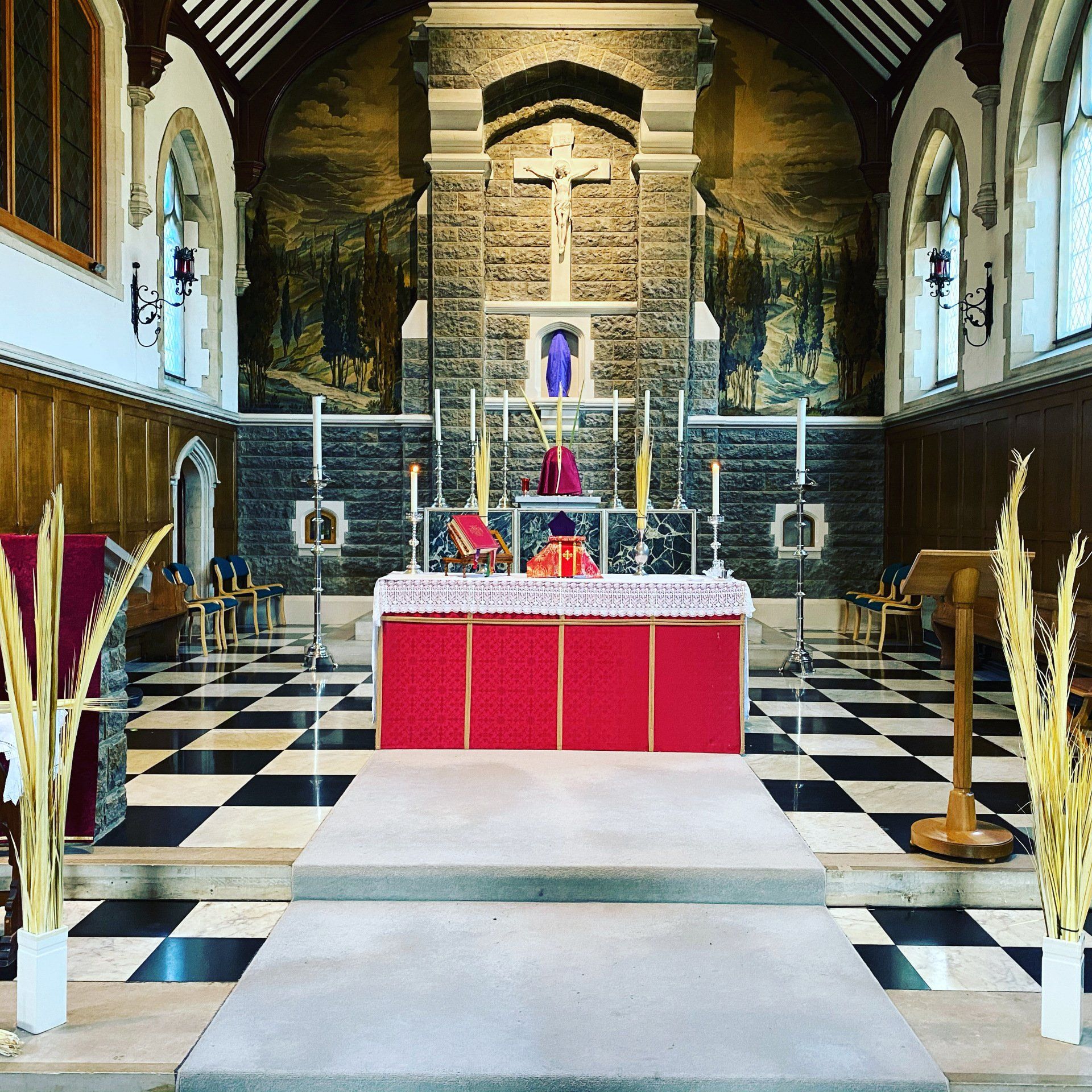
Applications are now open. To register your interest, please speak to Fr Tristan or Deacon Tom after any Mass and they will be able to give you an application form in person. Forms are not available from the Parish Office. The closing date for completed applications and supporting documentation is Friday 14 th November 2025 . We’re unable to accept late applications, so please get your paperwork into the Parish Office as soon as possible and no later than the closing date.
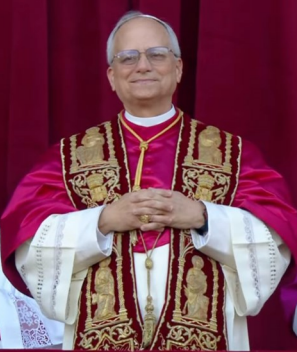
The Holy Father is currently giving a cycle of catechesis on the theme of Hope in this Jubilee Year. Anyone struggling at the moment to connect with Jesus, our Hope, may find power in this extract from one of his recent reflections, given on 25th June. Dear brothers and sisters, Today we will again consider the healings of Jesus as a sign of hope. In Him, there is a strength that we too can experience when we enter into a relationship with His Person. A very widespread ailment of our time is the fatigue of living: reality seems to us to be too complex, burdensome, difficult to face. And so we switch off, we fall asleep, in the delusion that, upon waking, things will be different. But reality has to be faced, and together with Jesus, we can do it well. At times we feel blocked by the judgment of those who claim to put labels on others. It seems to me that these situations can find an answer in a passage from the Gospel of Mark, where two stories intertwine: that of the twelve-year-old girl, who is sick in bed and is dying; and that of a woman who has been bleeding for precisely twelve years, and seeks out Jesus in order to be healed (cf. Mk 5:21-43). This woman, with great courage, made the decision that would change her life: everyone continued to tell her to keep her distance, to keep out of view. They had condemned her to stay hidden and isolated. At times, we too can be victims of the judgment of others, who presume to put a robe on us that is not our own. And then we suffer, and cannot come out of it. That woman embarks on the path of salvation when the faith that Jesus can heal her germinates: so, she finds the strength to come out and go in search of him. She wants to reach out and at least touch his garment. Around Jesus there is a large crowd, and therefore many people were touching him, and yet nothing happens to them. Instead, when this woman touches Jesus, she is healed. Where does the difference lie? In his commentary on this point of the text, Saint Augustine says – in Jesus’ name – “The crowd jostles, faith touches” (Sermon 243, 2, 2). It is thus: every time we perform an act of faith addressed to Jesus, contact is established with Him, and immediately his grace comes out from Him. At times we are unaware of it, but in a secret and real way, grace reaches us and gradually transforms our life from within. Perhaps today too, many people approach Jesus in a superficial way, without truly believing in his power. We walk the surfaces of our churches, but maybe our heart is elsewhere! This woman, silent and anonymous, conquers her fears, touches the heart of Jesus with her hands, considered unclean because of her illness. And she is immediately healed. Jesus says to her: “Daughter, your faith has saved you. Go in peace” (Mk 5:34).

NEXT WEEKEND (5TH-6TH JULY) ORDINATIONS & MISSIONARY APPEAL - Next weekend will see the Ordination of Gary Carter and Scott Coleman to the Priesthood at Arundel Cathedral. The Ordination Mass will take place on Saturday 5th at 12noon, and will be livestreamed. The ordination of new priests is a moment of rejoicing for the whole Church, and I am sure we will all pray very hard for soon-to-be Fathers Gary and Scott as they begin a lifetime of ministry here in the diocese. All things being equal, they will also be the last priestly ordinations for at least three years in the diocese: a reminder to pray for more vocations! As Vocations Director, I will be busy elsewhere over the Ordination weekend, but I am delighted that the weekend Masses will be covered in the parish by the Missionaries of Africa (the 'White Fathers'), in the person of Bishop John MacWilliam, former Bishop of Laghouat, Algeria. Bishop MacWilliam has strong ties to our deanery, having been educated at Worth. I am sure that you will all give him a warm welcome, and contribute generously to the work of the Missionaries across 24 countries across the African Continent. The Missionaries state on their website: "Our aim is to proclaim the Gospel to the peoples of the African world. Because of its origins, our Society has always had a particular interest in making contact with and understanding Muslims and the Islamic world. All people everywhere are considered by God to be his children. But how can they know that unless someone tells them? ... God needs those who are sent to accept his mission and go! We share this relationship of children of God with those who have never heard, or those who have not understood, or those who have forgotten. We do not impose our beliefs, nor do we despise cultures other than our own. Instead, we offer to share with others the best we have, what is most important in our lives, what makes sense of our lives. We have received freely and must give freely. It would be selfish to refuse to share.... First we speak, but actions speak louder than words..... In Africa, this often means parish work, building up Small Christian Communities, working with the Media, involvement in Justice and Peace issues, inter-religious encounter, care for the environment, agriculture, seminary training both for ourselves and for the various dioceses, education and social welfare. The Missionaries of Africa aim to work in partnership with the local Church in Africa…and above all else, to help build up the leadership of the Churches.”

Dear brothers and sisters in Christ, As we celebrate the solemnity of Saints Peter & Paul, I invite you all to join me in prayer for Pope Leo, that he continues to be strengthened by the Holy Spirit in his task as shepherd of the flock entrusted to him. As our Holy Father, he brings particular gifts to the Church through his experience in Peru, where he served with some of the priests of our own Diocese; his times of leadership of the Augustinian Friars, and his service in the Dicastery for Bishops. He comes to the Petrine Office at a difficult time for the world. Let us join him in fervent prayer for peace – for which he has called so many times in these first weeks of his papacy. With him, and in the spirit of his predecessor, Pope Leo XIII, let us continue to strive for justice and promote the dignity of every person at every moment of life. St Peter, our first Pope, could not have imagined the steps he would be called to take in the service of the Lord. This is true of Pope Leo and, indeed, of every one of us. The life that is given to us in baptism – life lived in the love of the Holy Trinity – calls us to follow the Lord Himself, wherever he may lead us. As His disciples, we are called to learn from Him, to grow ever closer to Him, to be always faithful in our witness to Him. This is what it means to be a Pilgrim of Hope, for we journey towards the One who died and rose from the dead that we might have life – and whose first gift after the Resurrection was the gift of peace. As Pilgrims of Hope, may we – with Pope Leo – strive to share that gift with the world. With every blessing,

Dear brothers and sisters in Christ, In this Sunday’s Gospel, Jesus speaks with clarity of the Father, Himself as the Son, and the Holy Spirit. His words express the unity that exists between the three persons of the Blessed Trinity. The Holy Spirit will speak what comes from the Son, who has all that belongs to the Father. We express this in the Creed when we speak about the Holy Spirit coming from the Father and the Son. The mystery of the Trinity is about relationships – the relationships that exist between Father, Son and Spirit, one God. The wonder of God, existing eternally – as we hear in the First Reading this Sunday – pours love into our hearts, as St Paul reminds us. It is truly wonderful for us to reflect that, through our baptism, we are brought to live our lives in the love that exists in the Trinity. We are enabled to live in relationship with a God who is all love and whose love we see and experience as it is lived between Father, Son and Holy Spirit. As we rejoice in our relationship with the one God, three Persons, let us recall that it is God who gives us life and, in the coming days, pray very especially for respect for life in our own society as those in parliament prepare to vote on the “Assisted Dying Bill”. If you have not written to your MP, there is still time. May I thank all those who have written, for such action is a powerful witness to the wonder of life, given us by God. With every blessing,
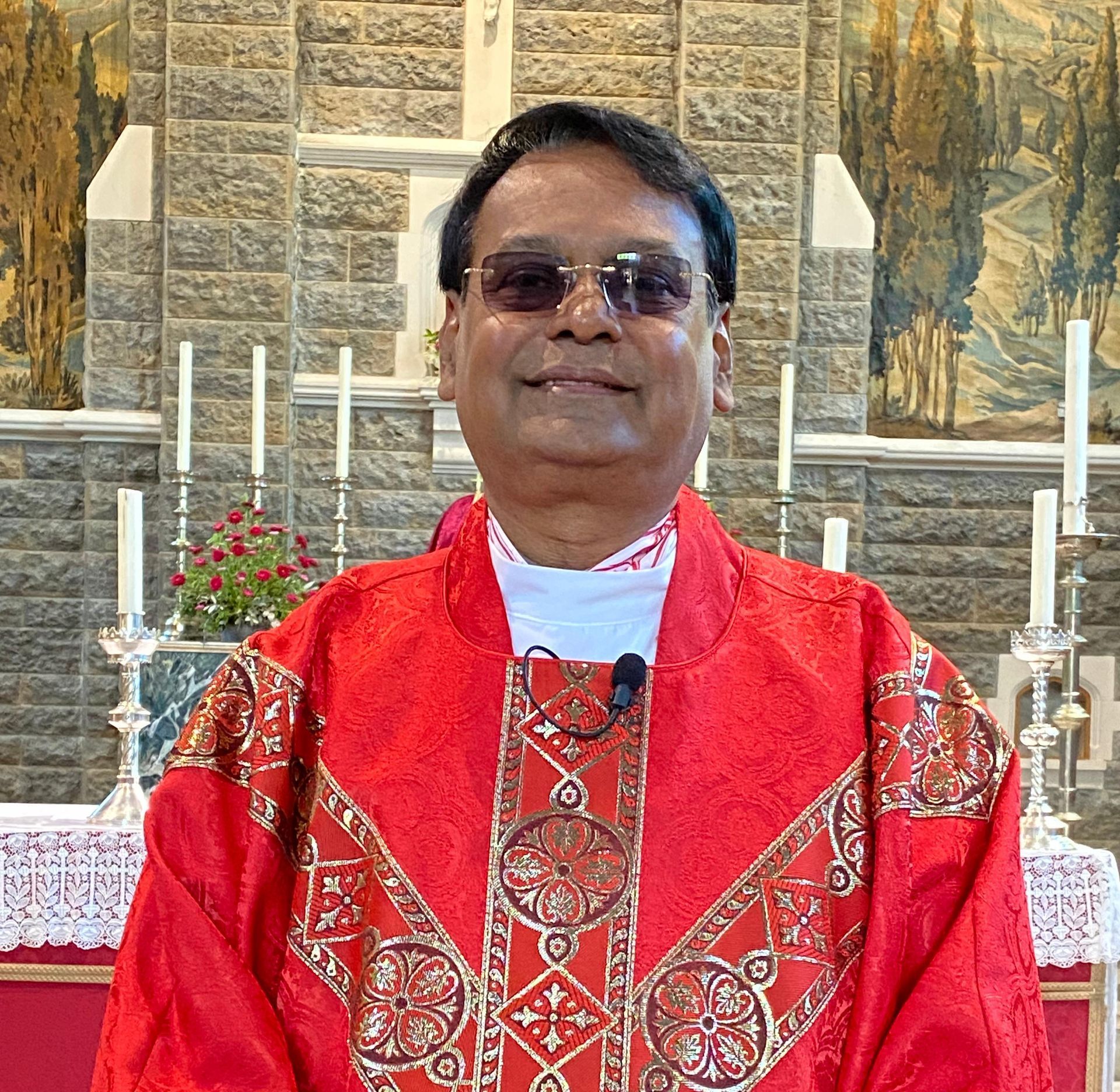
Farewell and goodbye can often evoke feelings of sentiment, sadness, and departure, but they also mark an occasion of joy and the renewal of hope. We must trust in ourselves to move from the ordinary into the extraordinary, from this moment here in Horsham to every corner of the world. Through the power of the Holy Spirit, we are called to be available to all who wish to collaborate, share, and grow together. As I say goodbye, I carry with me all the cherished memories of your loving care, comforting hugs, and unwavering support. I thank you from the bottom of my heart, knowing that you will be there for me, even as I embark on my ministry and face times of need. A special thanks to Fr. Tristan for your kindness—you have made this year a memorable one for me. The portrayal of Pentecost in the Gospel is a vibrant and powerful image of the early church, awakened as an active missionary community. The Holy Spirit descends upon the apostles, with tongues of fire alighting on their heads, breathing new life into this group. The transformation is nothing short of radical: once fearful and hiding in the upper room, they are now emboldened, inspired to go into the marketplaces and boldly proclaim the crucified Christ they believe in. They are no longer the trembling individuals they once were. They have been changed, transformed into a new creation—enthusiastic, eloquent, and with a profound sense of their vocation. The first Pentecost was indeed a striking and exciting moment in the life of the Church. However, the coming of the Holy Spirit is not a singular event confined to the Church’s foundation. The gift of the Holy Spirit, which was given at Pentecost, is still available to the worshipping community here in Horsham, provided we are open and willing to receive it. The Holy Spirit works through human beings like ourselves, depending on our willingness to respond to His promptings. This feast day offers us an excellent opportunity to reflect on how we are using the gifts God has entrusted to us. While our gifts may not always be as spectacular as those that amazed the onlookers at the first Pentecost, their value is no less significant. What matters most is how we use our talents for the benefit of others—whether we are a patient father, a loving mother, a good listener, a generous giver, or someone who takes time for the elderly and the needy. Let us all pray together: "Come, Holy Spirit, fill the hearts of Your faithful and enkindle in them the fire of Your love." My contact details: Fr. Xavier Amirdasamy, PP and VF. St. Joseph’s RC Church, THIRUVALLUVAR NAGAR, LALGUDI S.O. TRICHY Dt-621702. Tamil Nadu, South India. Mobile and WhatsApp +919443247835, Email xasun@yahoo.com.
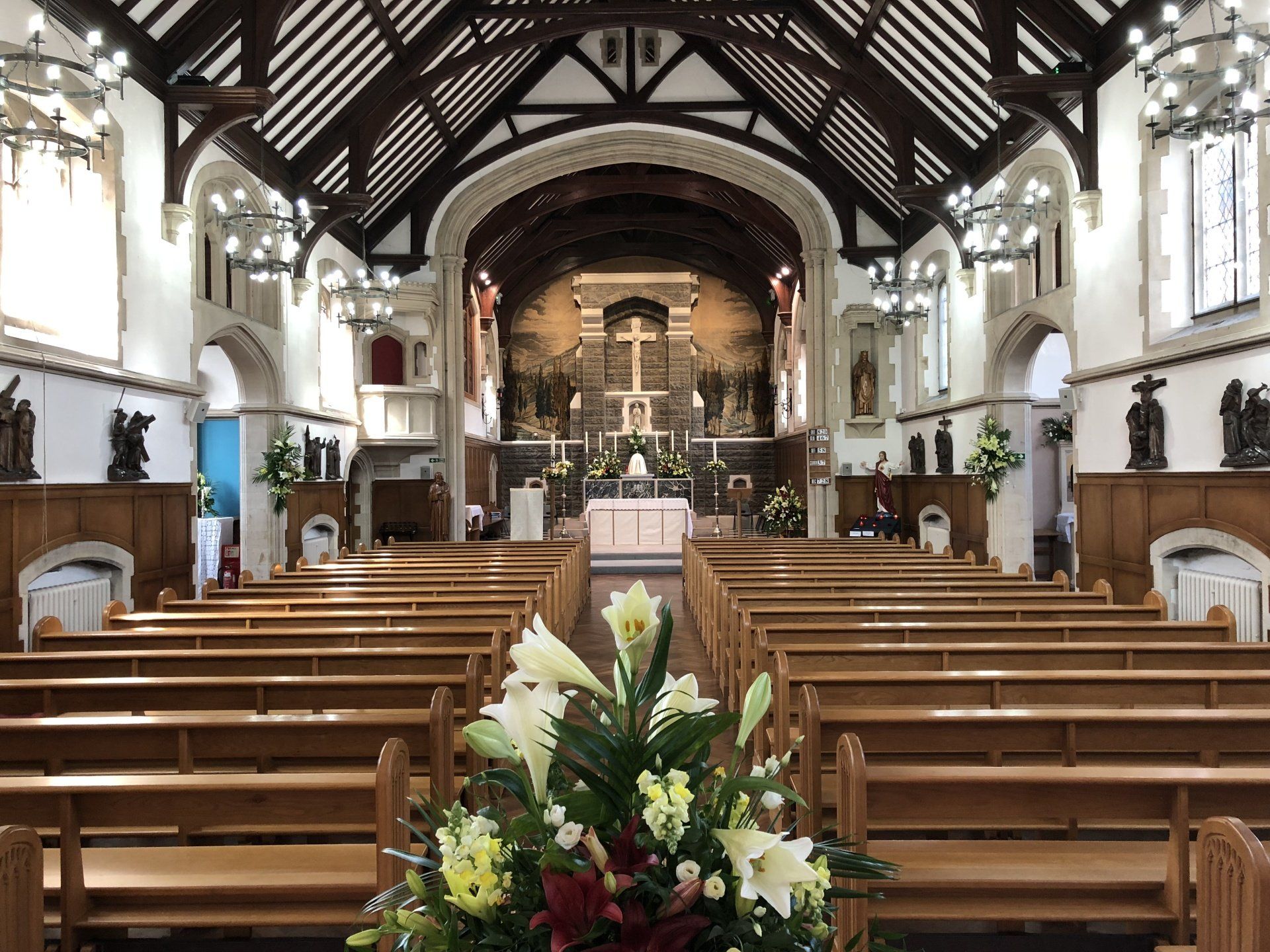
Our ‘normal’ weekday Mass times will be changing from Monday 16th June, once Fr Xavier departs. The new schedule will be as follows: Monday - 12 noon, Tuesday - 7:30 in the morning, Wednesday – no Mass, Thursday – 12 noon, Friday – 12 noon. Occasionally, we may find we need to alter a ‘normal’ weekday Mass time, so please continue to check the weekly Mass times that are published in our Newsletter and on the website.

THIS WEEKEND’S SECOND COLLECTION - is for World Communications Day, which supports the Church’s apostolate in the mass media. The theme for this year, chosen by the late Pope Francis, is ‘Share with gentleness the hope that is in your hearts.’ (cf. 1 Peter 3:15-16) You can donate via the baskets or the card machines at the back of the church. Please note that this is not a Gift Aid-eligible collection. Thank you for your generosity.
